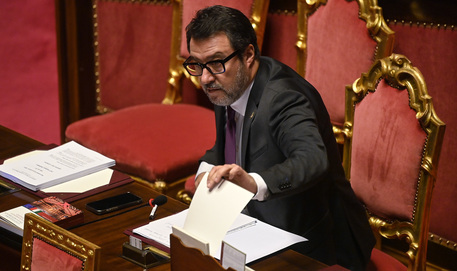(ANSA) - ROME, NOV 20 - The Senate on Wednesday gave
definitive approval to Deputy Premier and Transport Minister
Matteo Salvini's reform of the Highway Code.
The law, which had already been approved by the Lower House,
passed with 83 votes in favour, 47 against and one abstention.
It stiffens the penalties for using mobile phones at the wheel,
with fines of between 250 and 1,000 euros and a driving ban of a
week if you already have points in your licence.
This can go up to a three-month ban and a fine of 1,400 euros
for repeat offenders.
The fines and bans double if the use of the telephone causes an
accident.
Under the reform, it will be possible for speeding fines to go
up as high as 880 euros for people who break the speed limit
inside cities twice a year or more and they face having their
licence suspended for 15 to 30 days.
The penalties for driving under the influence of alcohol goes
from a fine of between 573 and 2,170 euros and a licence
suspension of three to six months if the blood alcohol levels is
between 0.5 and 0.8 grams per litre.
People with blood alcohol levels between 0.8 and 1.5 grams per
litre risk a fine of up to 3,200 euros, a driving ban of between
six months and a year and a jail term of six months.
If the level is over 1.5 grams, the fine can go as high as 6,000
euros, the driving ban up to two years and the jail term up to
one year.
There is also the obligation to install a breath alcohol
ignition interlock device after getting the licence back.
People caught driving under the influence of drugs face bans of
up to three years. The bill obliges motorists to respect a
distance of 1.5 metres when overtaking cyclists.
Users of e-scooters will be obliged to wear helmets, have a
number plate and get insurance - although subsequent legislation
will set out the details on this.
It will not be possible for local authorities to issue motorists
with more than one speeding fine for repeated breaches that come
within an hour of each other.
If there is more than one, the motorist must pay only the
biggest fine, plus a third. People who abandon animals at a road
side face losing their licences for between six months and a
year and they risk seven years in jail if an accident is caused
by the abandoned animal.
Salvini on Wednesday said his reform will reduce road deaths in
Italy.
"The new Highway Code is finally law", Salvini said, commenting
on the Senate's vote that gave it definitive approval.
"More security and prevention, fight against abuse and incorrect
behaviour, updated rules and true road education", he wrote on
social media.
The reform, wrote the minister, was drafted after lengthy talks
with associations, local institutions, representatives of the
automotive sector and experts "with a common objective: reducing
massacres on Italian roads", he wrote, denying "fake news" on
huge fines for speeding.
However, consumer association Codacons said Wednesday that the
reform could prove useless without an increase in traffic
policing.
"The crackdown on the use of cell phones behind the wheel,
driving under the influence and the measures regarding
e-scooters are, together, positive initiatives but risk not
producing the desired effect on road safety", said the group's
president Carlo Rienzi.
He recalled ISTAT's figures on the first semester of this year,
compared to the same period in 2023, showing a 0.9% increase in
the number of road accidents with injuries and a 4% rise in road
deaths with a 7.9% peak in fatal road accidents in urban
centres, "which would require utmost vigilance", he said.
Meanwhile, members of the centre-left opposition criticized the
reform as "short-sighted" and "merely a slogan".
Democratic Senator Lorenzo Basso said it sent a "dangerous
message: it is possible to speed, to risk, rules can be violated
without paying the consequences".
He called the reform "short sighted and anachronistic" noting
that it limited "the use of technology to register speed, a
fundamental tool to save lives, especially in urban areas",
among other things.
The Five-Star Movement whip in the Senate's transport commission
Gabriella Di Girolamo, said the reform was merely a "slogan"
with few concrete measures to improve road safety.
Di Girolamo also criticized the fact that a highly needed
crackdown on those driving under the influence "is substantially
transformed into a ban on using any type of medicine".
"Those forced to take commonly used medicines like paracetamol
will actually not be able to drive", according to the Senator.
(ANSA).
>>>ANSA/Senate approves Salvini's Highway Code reform
Penalties for drunk driving, abandoning animals stiffened
